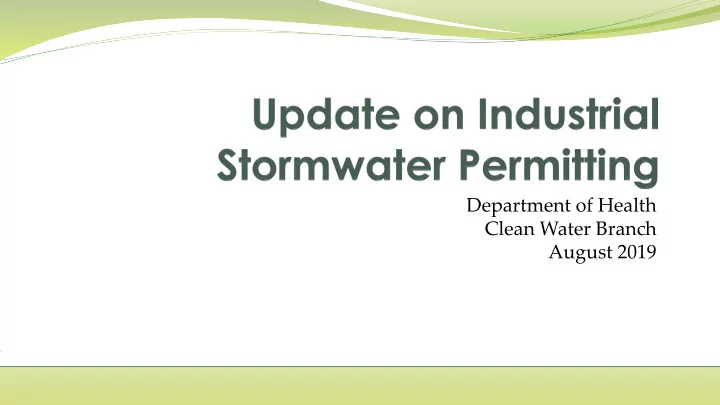

Department of Health Clean Water Branch August 2019
Ag e nda Why industrial stormwater is regulated. Industrial activities requiring NPDES permits. Stormwater mixed with wastewater. Determining if your industrial facility requires a NPDES permit. How to apply. Update on new approach.
Why is Sto rmwa te r fro m I ndustria l Ac tivitie s Re g ula te d b y NPDE S Pe rmits? Most industrial activities exposed to stormwater. As rain comes in contact with raw materials, fuels, oils, chemicals, and dust, water pollutants are often picked up and transported to State surface waters. NPDES industrial stormwater permits provide information and requirements to reduce polluted stormwater flowing to State surface waters from facilities. Requirements include finding effective stormwater management methods for the specific facility, sampling stormwater to confirm chosen management methods are working and change them if they aren't, and reporting annually to the CWB. Although one facility may contribute minimal pollution to State waters, cumulative impact of many facilities' stormwater runoff can result in significant water quality problems.
Whic h I ndustria l Ac tivitie s Re q uire NPDE S Pe rmit fo r Sto rmwa te r Disc ha rg e s? All facilities with primary Standard Industrial Classification (SIC) Codes listed and/or described in 40 CFR §122.26(b)(14)(i) through 122.26(b)(14)(ix) and 122.26(b)(14)(xi) or designated by the DOH Director are required to obtain NPDES permit coverage for discharges of stormwater associated with industrial activities. List of regulated SIC Codes available at: https://eha- cloud.doh.hawaii.gov/epermit/docs/Industrial%20Storm%20Water%20S IC%20Codes.pdf.
I s Sto rmwa te r Mixe d/ Co mming le d with Wa sh Wa te r, Pro c e ss Wa ste wa te r, o r Othe r T ype s o f E fflue nt Co nside re d I ndustria l Sto rmwa te r? No. Stormwater mixed/commingled with any type of wash water, process wastewater, or any other type of effluent is considered wastewater. If you plan on discharging this type of mixed/commingled wastewater to a State surface water, you need to obtain an NPDES permit for wastewater discharge.
De te rmining if Yo ur I ndustria l F a c ility Re q uire s a NPDE S Pe rmit. See CWB website for detailed instructions, guidance documents, and past presentation slides: http://health.hawaii.gov/cwb/permitting/industrial-storm-water/. Review the SIC codes and narrative activities that require coverage. See: https://eha- cloud.doh.hawaii.gov/epermit/docs/Industrial%20Storm%20Water%20S IC%20Codes.pdf.
De te rmining if Yo ur I ndustria l F a c ility Re q uire s a NPDE S Pe rmit. Verify your facility's SIC code(s) on your federal tax form. Businesses are designated by their SIC code(s) or by narrative activities often for commerce/revenue purposes. Federal tax form SIC code(s) typically located on upper left of Schedule C or C-EZ for Sole Proprietors, Form 1065 for Partners, Form 1120 for C Corporations, or Form 1120-S for S Corporations. SIC Codes - older coding. North American Industry Classification System (NAICS) Codes - Newer coding. For more information and for NAICS to SIC conversion tables see: http://www.census.gov/eos/www/naics/.
De te rmining if Yo ur I ndustria l F a c ility Re q uire s a NPDE S Pe rmit. If your facility has a regulated SIC Code and/or narrative activity, you will be required to: Obtain NPDES permit coverage for storm water associated with industrial activities, or If your facility has a regulated SIC Code and/or narrative activity, but your industrial materials and activities are not exposed to storm water, you may be eligible for a conditional “No Exposure” exclusion.
Ho w to Apply. Individual permit Complete e-Permitting CWB Individual NPDES Form. $1000 filing fee. Requires public notice (additional cost) and 30-day comment period. Currently, only choice available since industrial stormwater General Permit expired. General Permit HAR 11-55, Appendix B General Permit. Expired. E-Permitting CWB NOI Form, $500 filing fee, and no public notice.
Ho w to Apply. Conditional "No-Exposure" Exclusion (CNEE) You can obtain a CNEE if all of your commercial/industrial activities or products do not come into contact with any precipitation including any stormwater runoff. E-Permitting CWB "No Exposure" Certification Form, no filing fee, and no public notice. Good for 5 years.
Upda te o n Ne w Appro a c h. Expired Industrial Stormwater General Permit CWB currently working on renewing this General Permit. Expired General Permit Approach: Broad requirements allowing Discharger to develop their own stormwater management practices. Annual stormwater monitoring for BOD 5 and COD. Annual stormwater monitoring with effluent limits for TSS, TP, TN, nitrate+nitrite nitrogen, oil and grease, pH, and present or potential toxic pollutants. Additional stormwater monitoring for any parameter that exceeded effluent limits. Monitoring continues until limitations are met or unless otherwise informed by DOH.
Upda te o n Ne w Appro a c h. Proposed (Draft) General Permit Approach: Follow EPA's Multi-Sector General Permit approach using Best Management Practices and benchmark monitoring instead of numeric Water Quality Based Effluent Limits. Exceedance of a benchmark is not a violation. Instead it will trigger follow up action. Not doing the follow up action is a violation. More prescriptive, overall and industry specific stormwater management practice requirements. Allowance for certain types of non-stormwater discharges (e.g. fire fighting, air conditioning condensate, irrigation drainage, etc.).
Questions? Contact information for questions on NPDES permits and Section 401 WQCs:
Recommend
More recommend